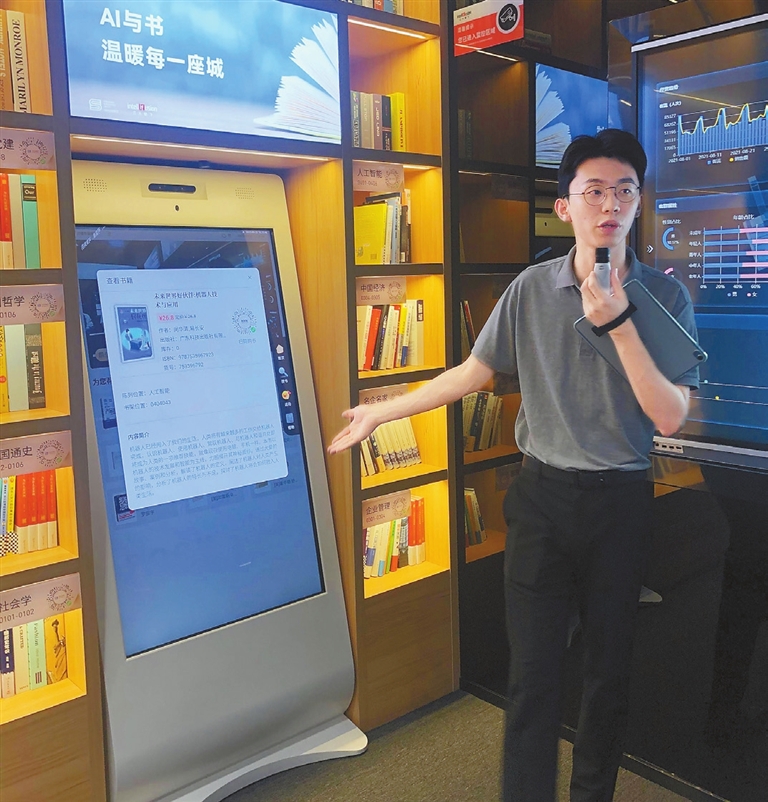
Xia Yuanjie szrbgracexia@126.com NANSHAN-BASED Shenzhen Intellifusion Technologies Co. recently won its third Wu Wenjun AI Science & Technology Award, the highest prize in China’s AI field. The enterprise has since become the only Chinese AI firm that was recognized with the Wu Wenjun award for its outstanding achievements in all three fields: algorithms, AI chips and applications. Intellifusion, founded in 2014, has gone from a small team of doctorate degree holders to an AI unicorn with nearly 1,000 staffers at present. The firm provides AI products and services in various sectors, including public security, social governance and the Artificial Intelligence of Things (AIoT) fields, which have been widely applied in more than 100 cities, including Shenzhen. In the early days of Intellifusion, AI technology was not yet in widespread use and its application scenarios were limited. The founding team was determined to build a full-stack AI tech platform integrating algorithms, chips and big data. “If we compare AI to children, algorithms, chips and data are their souls, bodies and food, respectively. It is necessary to combine the three organically, whether it’s for an enterprise or an industry,” Zheng Wenxian, vice president of Intellifusion, told reporters during a recent media research tour at the company. Intellifusion launched its research and development (R&D) of neural processing units in 2015. Its independently developed AI chips, “DeepEye1000,” were successfully taped out in 2018 and put on the market in 2019. Li Aijun, one of founders and chip set head at Intellifusion, said that “As of now, Intellifusion has developed the third generation of instruction set architecture and the fourth generation of neural processing unit, and made them for commercial use.” “Each member of our chip R&D team has more than 14 years of designing experience on average,” Li added. Based on Intellifusion’s state-of-the-art multidimensional capabilities in algorithms, chips and big data, the firm launched a series of products and solutions targeting the digital city and people’s livelihood. The company developed the world’s first non-cooperative facial recognition system, “DeepEye,” which was initially applied in Shenzhen and is now replicated across multiple Chinese cities. Since the first generation of “DeepEye” system was adopted by Longgang District in 2015, it had assisted the public security department in cracking over 4,000 cases, such as human trafficking and theft, in two years. With the help of “DeepEye,” Shenzhen’s police found an abducted 3-year-old boy just 15 hours after receiving a missing person report in 2017. At 2020’s China Hi-Tech Fair, the company released its strategic goal to establish “1+1+N” self-evolving city intelligent twins in Shenzhen, which will contain an ubiquitous and intelligent sensor network, a self-learning and self-evolving city super brain, and numerous AI-empowered smart applications. Intellifusion is currently working full steam ahead to achieve this goal. It helped Longgang’s government affairs data administration establish an AI platform with 31 application scenarios in six major areas, achieving “management via a single website” and offering around-the-clock automatic intelligent analysis and early warning services. With the assistance of a smart routine optimization system created by Intellifusion, Shenzhen Bus Group took the lead in applying high-precision OD (origin-destination) analysis based on head-shoulder contour extraction among Chinese mega-cities. The concept of self-evolving city intelligent twins was written into Shenzhen’s government work report in both 2021 and 2022. The city is set to implement China’s first special regulations on the AI industry next month. “Shenzhen’s bold moves as a pilot demonstration zone for socialism with Chinese characteristics provide institutional guarantees for AI companies to solve difficulties they face while marketing products,” Zheng said. | 
